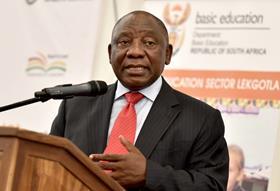
South African president Cyril Ramaphosa’s appointment of his new cabinet after marathon behind the scenes negotiations is expected to find favour with most in the South African fruit sector.
In particular, fruit growers will welcome the return of seasoned politician, Thoko Didiza, as minister of agriculture. She will also manage the portfolio of Land Affairs, which is likely to feature strongly in the new administration as the land issues in South Africa progress further.
While the appointment of crucial cabinet members who will play a leading role in fixing South Africa’s economic woes will generally be applauded, it is also clear from the past week’s developments that president Ramaphosa still has to deal with many problems in his own party.
Commentators say that the previous vice-president, David Mabuza, who was until this week still under investigation by his own party’s integrity committee, virtually held the president and the country to ransom to secure his re-appointment.
It is however the appointment of Didiza that will keep the fruit sector smiling today. She previously served as deputy minister of agriculture under Nelson Mandela and then had seven years as minister of agriculture under Thabo Mbeki. However, after that she was banished into the political wilderness by the now disgraced Jacob Zuma.
Last year Didiza received much praise for her work in Parliament where she chaired the ad hoc committee which looked at the need to amend Section 25 of the Constitution, which deals with the question of land expropriation without compensation.
In agri-media circles Didiza’s return is considered to be a dramatic comeback. This time around she will be assisted by two deputy ministers, Sdumo Dlamini and Mcebisi Skwatsha.
Dr Vuyo Mathlati, president of the African Farmers Association of South Africa (AFASA), is reported as saying that the agri sector is now dealing with a person who has a very clear understanding of both portfolios – agriculture and land reform.
'What we like is that it’s not going to take her long to learn or try to understand (the pressing issues), we are going to be dealing with a person who understands, so the catching up is going to be, hopefully, a quick process.
“In this sector we have no time, in land reform and agriculture. There are three critical issues, we appreciate the leaner cabinet and the new minister of agriculture and what we are hoping for at this stage is that there will be true investment from a budget perspective for both agriculture and land reform,” says Mahlati.
Agbiz (Agricultural Business Chamber) chief economist Wandile Sihlobo says Didiza’s vast experience and knowledge of the sector will be key in providing leadership in land reform policy and implementation, as well as promoting agriculture’s role to boost rural economic growth and job creation.
One veteran table grape grower, who knows Didiza from her first stint as agriculture minister and hosted her on his farm on the Orange River, says he was pleased with her appointment. “President Ramaphosa had to make concessions but he also won big, we look forward to working with her in building our sector and boosting the economy of the country.”
With the resolution of the crucial land debate expected to continue to be one of the major policy directions of the new administration, it is expected that Didiza will have to hit the ground running.



